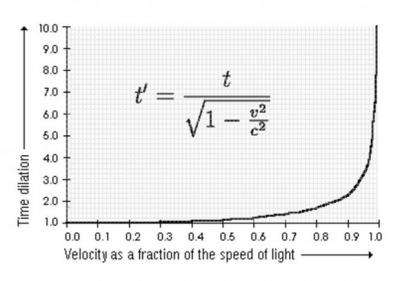Astronomy without a telescope -- time freeze

There is a story told about traveling at the speed of light in which you are asked to imagine that you begin by standing in front of a big clock – like Big Ben. You realize that your current perception of time is being informed by light reflected off the face of the clock – which is telling you it’s 12:00. So if you then shoot away at the same speed as that light – all you will continue to see is that clock fixed at 12:00, since you are moving at the same speed that this information is moving. And so you discover that at the speed of light, time essentially stands still.
While there are a number of things wrong with this story – as it happens, one correct thing is that if you were able to travel at the speed of light you would experience no passage of time – although there are several reasons why this is probably an impossible situation to find yourself in.
But nonetheless, if you were able to travel at light speed and not experience the passage of time – then you would have no time available to reassess your situation – indeed there would be no time available for your neurons to fire. So, you might well leave Earth with the image of the clock fixed on your retina, but since your brain has stopped working, this has nothing to do with the information carried in the light beam you are moving along with. Your retina is never refreshed with a new image as long as you stay at the speed of light.
Some insight into special relativity is gained by considering the context of someone who stayed back on Earth. If your light speed trip was aimed at a mirror at Alpha Centauri (4.3 light years away) – then from their perspective, it takes you 8.6 years to go there and bounce back. This is true even though you leave and return with an image of 12:00 stuck on your retina and rightly announce that (from your perspective) no time has passed since your departure.
But moving at light speed and experiencing no passage of time is probably an impossible scenario for we mass-challenged beings. Relativity has it that you possess a proper mass, a proper length and a proper time – which persist regardless of your velocity. If you could survive the G forces to get up to such speeds, then you could happily coast at 99.95% of the speed of light and check your pulse against your watch to find your heart still beating at 72 beats per minute – just like it did back on Earth.

It’s only when you check back with Earth that you see that something remarkable is happening. Moving at 99.5% of the speed of light gives you a time dilation factor of around 10. So while someone back on Earth will still measure your trip duration at about 8.6 years – for you it will only be around 10 months. And with a remarkably good telescope you might look back to Earth and see a distorted Big Ben, red-shifted and running slow on the way there and then blue-shifted and running very fast on the way back.
One of the reasons that probably makes the experience of light speed/time freeze unobtainable is that time dilation keeps increasing the faster you move, For example, at a speed of 99.99995% of the speed of light you get a time dilation factor of about 1,000. So even if you have a spacecraft with an infinite power source capable of seemingly infinite velocities – you will keep arriving at your destination before your speedometer makes it all the way from 99.99999(etc)% of the speed of light to c = 1.0.
This is perhaps how we will populate the universe – using difficult-to-imagine investments of energy, coupled with the principle of time dilation to cross vast distances. The trick is not to get homesick, because after covering such distances you can never go back – unless it is to meet your very, very, very great grandchildren.
(I have cheated a bit by ignoring any periods of acceleration and deceleration within the journeys described here).
More information: Relativity calculator
Provided by Universe Today



















